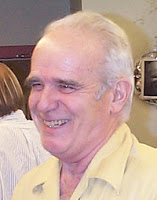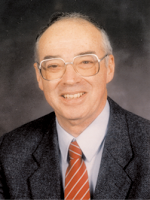Geologic Genealogy
Ever since I read Ian Stimpson’s blog post on his academic genealogy, I have been fascinated in trying to figure out my geologic lineage.
My Ph.D. advisor Terry Quinn (and committee member Fred Taylor) were both graduate students of Robley K. Matthews at Brown University (though Fred went on to do his Ph.D. with Art Bloom at Cornell). He also advised Tom Crowley, Richard Poore, Bill Curry, & Rick Fairbanks amongst other paleoclimate/paleoceanography stalwarts. R. K. Matthews was a sedimentary geologist who worked on the Bahama Bank, Barbados, and Belize and was also interested in foraminiferal sediments and paleoclimate. He is (in)famous for writing a letter with George Kukla to (then) President Nixon, which many of you will be familiar with, about global cooling and an imminent ice age for the Earth. RK Matthews seems to be a fascinating man.
Although, obtaining information about R. K. Matthews on the internet proved to be quite the tricky task. Cursory internet scouring only took me so far before I hit a dead-end: I couldn’t find out who his advisor was. Distressed, I asked Fred about the matter (which I should’ve done earlier), and he informed me that Edward Purdy at Rice oversaw Matthews’ Ph.D. Armed with this information, I stepped the sleuthing up a notch. From here on, it was quite easy as all the academic ancestors turned out to be eminent professors with detailed biographies (or obituaries) up till a certain degree of separation. Without further ado, my academic genealogy:

1. Terry Quinn
Paleoceanography/Paleoclimatology
Brown University
Trivia: Coincidentally, Terry is a panel member with my summer-research advisor in India, Rengaswamy Ramesh on the IPCC & PAGES project. [Image Source & Source]
2. Robley K.Matthews (1935-)
Sedimentary Geology/Paleoclimatology/Paleoceanography
Rice University
Trivia: Wrote a letter to President Nixon warning him of imminent global cooling. [Image Source]
3. Edward Purdy (1931-2009)
Carbonate/Petroleum Geology
Columbia University
Trivia: His first paper was titled A Bahamian Faecal-Pellet Sediment [link] [Image Source]
4. Norman Newell (1909 – 2005) & John Imbrie (1925-)
Paleontology/Paleoclimatology/Paleoecology
Yale University
Trivia: Norman Newell was the curator of the American Museum of Natural History & advised Stephen Jay Gould & Niles Eldridge amongst others. John Imbrie was a paleoclimate giant who worked out that Ice Ages were due to Milankovitch Cycles. [Image Source & Source]
5. Carl Owen Dunbar (1891-1979)
Invertebrate paleontology/Stratigraphy
Yale University
Trivia: He grew up in Kansas and operated machinery on a ranch to harvest wheat before turning to geology. [Image Source]
6. Charles Schuchert (1856-1942)
Paleogeography/Paleontology
Did not formally get his PhD though he went on to become a professor at Yale.
Trivia: He coined the term paleobiology. [Image Source]
Here ends my 6 degrees of separation that I can trace down via doctoral advisors. However, since Schuchert was ‘mentored’ by James Hall, I can go further back if I sweep Schuchert not doing a PhD under the rug. To continue:
7. James Hall (1811-1898)
Chemistry/Stratigraphy/Paleontology
Rensselaer Polytechnic Institute
Trivia: Founding member of the National Academy of Sciences & first president of the Geological Society of America. [Image Source]
8. Ebenezer Emmons (1799-1863)
Stratigraphy/Geology
Rensselaer Polytechnic Institute
Trivia: Known as the founder of American Paleozoic stratigraphy. [Image Source]
9. Amos Eaton (1776-1842)
Botany/Chemistry/Mineralogy
Yale University
Trivia: Co-founded the Rensselaer Polytechnic Institute [Image Source]
10. Benjamin Silliman (1779-1864)
Chemistry
University of Pennsylvania
Trivia: First scientist to distill petroleum. [Image Source]
11. James Woodhouse (1770-1809)
Chemistry/Medicine
University of Pennsylvania
Trivia: Well-voiced opponent of the phlogiston theory. [Image Source]
At this point things start to get fuzzy, but here is the full list (of mainly physicians and medicine men) that follows, with snippets of trivia wherever I could find some:
12. Benjamin Rush (1746-1813)
13. William Cullen (1710-1790)
14. Alexander Monro (primus) (1697-1767)
15. Charles Alston (1683-1760) – Alstonia, a genus of evergreen trees was named after him by eminent botanist Robert Brown (of Brownian motion fame). Curiously, Alstonia is the official state tree of West Bengal.
16. Herman Boerhaave (1668-1738) – Founder of the modern, academic hospital. He was also the first to isolate urea from urine!
17. Burchard de Volder (1643-1709)
18. Franciscus Sylvius (1614-1672)
19. Adolph Vorstius (1597-1663)
20. Gibert Jachaeus (1578-1628) – Famed Aristotelian philosopher
21. Duncan Liddel (1561-1613)
22. John Craig (d. 1620)
23. Theodor Zwinger (1533-1588)
24. Bassiano Landi (?)
25. Giovanni Battista della Monte (?)
26. Niccolò Leoniceno (1428-1524)
With that, I couldn’t find any more leads. I was most impressed by the broad evolution of profession and specialty over the years and how the nationality of advisors changes from time to time. To sum up, I like what Stephen Jay Gould had to say about his advisor:
"The work of graduate students is part of a mentor's reputation forever, because we trace intellectual lineages in this manner. I was Norman Newell's student, and everything that I ever do, as long as I live, will be read as his legacy."
What is your academic/geologic genealogy?











